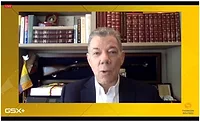General Stanley McChrystal delivers keynote address on leadership qualities and leading during crises at GSX+

On its third day, GSX+ kicked off with a keynote address on Military & Law Enforcement Appreciation Day by General Stanley McChrystal, former commander of U.S. and International forces in Afghanistan and best-selling author of "Team of Teams: New Rules of Engagement for a Complex World."
A retired four-star general, McChrystal is the former commander of U.S. and International Security Assistance Forces (ISAF) Afghanistan and the former commander of the nation’s premier military counter-terrorism force, Joint Special Operations Command (JSOC). He is best known for developing and implementing a comprehensive counterinsurgency strategy in Afghanistan, and for creating a cohesive counter-terrorism organization that revolutionized the interagency operating culture.
In his presentation, titled Leading in a New World, General McChrystal provided practical and actionable guidance on what it takes to lead successfully in a rapidly shifting world landscape taking lessons from his crisis management and strategic operations playbook. In his insightful keynote, McChrystal addressed such key leadership principles as transparency and inclusion, leveraging the power of teams through relationships, leading by influence, relentless mission focus, and sharing a clear vision with everyone who must execute against it – all against the shifting backdrop of the ever-evolving remote workplace.
“During crises and even in times of uncertainty, it’s critical to evaluate how we can be effective leaders,” General McChrystal said. “If we think about leadership, what does it look like? My father was a soldier; my father's father was a soldier. My brothers are soldiers. I grew up with the idea that there was a certain look and feel to leadership. For me, it was in uniform, and it was better if the person had a horse. But in reality, we tend to think of leadership of the way a person looks and the way they act, or a disciplined person with all the answers. Someone who walks down the hall and has an impact or inspires reaction.”
“What I found was in combat, and now in business, that's not what works best. In reality, you're talking about the effectiveness of the organization, not the effectiveness of an individual. I've come to believe that leadership actually looks a lot more like this, like a gardener, and you say, 'Wait a minute. What does a gardener do?’ and someone else will say, “A gardener grows flowers or vegetables.’”
“I'd say, ‘I don't think a gardener grows anything.’ Actually, only plants can grow things. But gardeners are still critical. They prepare the ground. They plant, they water, they feed, they weed, and at the appropriate time, they harvest. They create an environment or an ecosystem in which plants can do that, which only plants can do,” said General McChrystal. “So, when we think about leaders creating an organization, what they're doing is they're creating an environment, or an ecosystem, in which the people in the organization, including junior leaders, are able to accomplish the mission. That is a different role. For the leader, it’s a little less ego-based. It doesn't feel quite as regal to be a gardener, as opposed to the person standing on top of a pedestal, or on your horse or in this corner office of the C-suite.”
“The reality is that the most effective way to create an organization that's fast and adaptable is to create leaders that help create more leaders, and leaders that can help to create success. We're in a different world. Now, it is a team sport. It's not even just a team anymore. It's a team of teams. Unless those teams all function effectively and together, it's really hard for us to win. But that's what we can do. And it's an exciting adventure to be on.”
Today’s theme is “Leading in Turbulent Times.” For the rest of the day, GSX+ visitors can expect more than 25 sessions throughout the day, including:
- 11:20 am – 11:45am: What Does Good Cybersecurity Look Like? Through actual high-impact visuals, see what good cybersecurity looks like at the National Cybersecurity Center of Excellence (NCCoE), a national resource that can help businesses address cybersecurity threats to their organizations. Focused on creating, demonstrating, and documenting practical, standards-based cybersecurity solutions, learn how the NCCoE is addressing cyber threats to the healthcare, financial services, manufacturing, retail, and energy sectors and then freely sharing the solutions. From data security to network security, artificial intelligence to mobile and Internet of Things devices, catch a glimpse of how this federal resource is bringing people and organizations together to share their collective knowledge and experience with the goal of elevating the state of cybersecurity.
- 12:25 pm - 1:15 pm: COVID-19, Security & Resilience: Lessons Learned, Looking Forward. From the very first days of the pandemic, security and resilience professionals were instrumental to how companies navigated the complexities and varying impacts of the COVID-19 crisis. This panel of senior level security experts will discuss lessons learned, and how the role of security within the enterprise is evolving. You’ll hear recommendations for how best to influence the path forward through future waves, other crises, and long term security and resilience objectives.
- 1:55 pm - 2:20 pm: Security Assessments with Purpose and Sustainability: Scenario Based, Analytical and Action Oriented. Security assessments are the foundation of any security program and can be performed effectively with mobile technology. Explore the progression from a traditional assessment to a more engaging model using newest advances in technology. Learn how being proactive and allowing for a reoccurring process supports comprehensive strategies to reduce risk exposure and ensure program investments are commensurate with a systematic approach to measure and manage risk. Examine what scenario-based assessments provide that drive a comprehensive review of process improvement needs, organization maturity and tangible risk exposure. Evaluate the power of analytics in the process and how that will lead to predictive and prescriptive levers for the operations.
- 2:35 pm - 3:25 pm: Diversity, Equity and Inclusion- Strategic Imperatives for Success. Wide-ranging discussions, official statements, policy shifts and heated debates have come out of the racial tensions and civil unrest that have occurred worldwide recently. Besides a heightened awareness of unconscious bias and systemic racism, what are organizations and security professionals doing to actually influence change? What aspects of the business can benefit from a systemic approach to supporting a robust Diversity, Equity, and Inclusion Policy? Hear thoughtful insights and practical suggestions in this lively panel discussion.
The day will wrap up with a Military and Law Enforcement virtual happy hour at 3:30 pm.
To sign in to GSX+ sessions or to see recorded sessions you may have missed, visit www.gsx.org.
Looking for a reprint of this article?
From high-res PDFs to custom plaques, order your copy today!






